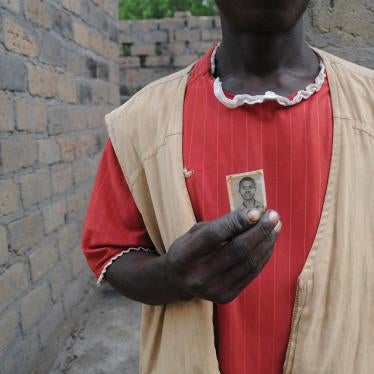(Nairobi) – Christian militias responding to rampant abuses by Muslim armed groups have committed atrocities against Muslim communities in northern Central African Republic, Human Rights Watch said in a report released today. Concerned countries should immediately bolster the African Union peacekeeping force in the country and support efforts by France to protect civilians, Human Rights Watch said.
The 43-page report, “‘They Came To Kill’: Escalating Atrocities in the Central African Republic,” based on weeks of field research in Ouham province, documents the surge in violence by Christian anti-balaka (“anti-machete”) militias since September 2013. The anti-balaka have killed several hundred Muslims, burned their homes, and stolen their cattle. So-called ex-Seleka forces, former members of the predominantly Muslim rebel alliance that overthrew the government in March, retaliated against Christians with the apparent knowledge of their commanders.
“The brutal killings in the Central African Republic are creating a cycle of murder and reprisal that threatens to spin out of control,” said Peter Bouckaert, emergencies director at Human Rights Watch and author of the report. “The UN Security Council needs to act quickly to bring this evolving catastrophe to a halt.”
Anti-balaka militias, comprising local vigilantes and soldiers loyal to the previous government, carried out coordinated attacks in September against Muslim communities and ex-Seleka outposts near Bossangoa, the Ouham provincial capital. While the anti-balaka describe themselves as self-defense forces aiming to protect their own villages, their actions and rhetoric are often violently anti-Muslim.
Many of the attacks by the anti-balaka involved shocking brutality: a Muslim nomadic cattle herder told Human Rights Watch she was forced to watch as anti-balaka fighters cut the throats of her three-year-old son, two boys, ages 10 and 14, and an adult relative – all the Muslim males in the cattle camp. A man tearfully described escaping from anti-balaka attackers, only to watch in horror from a hiding place as they proceeded to cut the throats of his two wives, his 10 children and a grandchild, as well as other Muslims they had captured.
A Muslim woman told Human Rights Watch that she was outside cooking at 5 a.m. when the anti-balaka came and attacked their home: “They began to cut my husband with their machetes on his side and his back, and cut his throat. After they killed him, they set our house on fire, and threw his body on the fire, together with my son’s. They ordered my 13-year-old boy to come outside and lie down, and then cut him two times with a machete and killed him.”
Following the anti-balaka attacks, the ex-Seleka forces in Ouham province retreated to Bossangoa, where they wreaked revenge on Christian residents, killing many and setting fire to their homes. They also attacked Christian farmers working in their fields.
The ex-Seleka revenge killings appear to have had the backing of senior commanders in Bossangoa, Human Rights Watch said. On November 18, the Bossangoa deputy commander, Colonel Saleh Zabadi, in the presence of his superior and a dozen officers, ordered the drowning of seven farmers who were wrongfully accused of being anti-balaka militia. The farmers were bound and thrown into the Ouham River; just three survived.
Serious abuses are continuing both in the north and in Bangui, Human Rights Watch said. On December 5, anti-balaka forces shot or slit the throats of at least 11 Muslim civilians in Bossangoa’s Boro district during their brief control of the town. An anti-balaka attack on Bangui and resulting violence left 400 to 500 Muslims and Christians dead. These recent killings, however, are only a fraction of the serious abuses against civilians since Seleka took power in March.
French peacekeepers in the country have conducted operations in Bangui and Bossangoa to bring an end to the killings, including disarming fighters on both sides.
The recent violence in the north has created a humanitarian crisis, Human Rights Watch said. Both sides have burned down large swathes of villages in Ouham province. Some 40,000 displaced Christians have sought refuge at the Catholic church in Bossangoa, while 4,000 Muslims remain on the opposite side of town. Humanitarian relief workers have found it difficult to provide assistance, particularly emergency medical aid, as aid workers have also been the targets of attacks.
The Security Council should immediately authorize a UN peacekeeping mission under Chapter VII of the UN Charter, Human Rights Watch said. It should have a robust mandate and the means to protect civilians, promote human rights, and create an environment conducive to the delivery of humanitarian aid.
“Urgent support for peacekeeping in the Central African Republic is crucial to bring stability to a tense situation, protect the population from abuses, and ensure that humanitarian aid reaches those at grave risk,” Bouckaert said. “The potential for further mass violence is shockingly high.”
Amnesty International will release a briefing paper documenting atrocities in Bangui, Central African Republic, on December 19, 2013 and a longer report in 2014.







